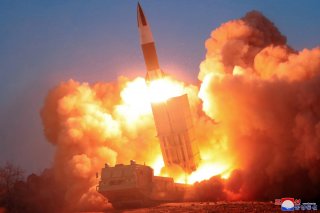A Donald Trump Second Term: A Dangerous Time for U.S.-North Korea Relations?
What happens if the bromance between Kim and Trump were to fail?
Editor's Note: The following is part of a new symposium here in Korea Watch that will analyze potential U.S. policy options towards North Korea should Donald Trump win reelection. Check back soon for more contributions in the coming days.
By his own reckoning, Donald Trump’s North Korea policy has been a success. U.S.-DPRK relations reached their nadir in the 2017 nuclear crisis, a crisis caused by the failed policies of Trump’s predecessors. Tensions ran high as he and Kim Jong-un traded personal recriminations (Little Rocket Man vs. mentally deranged U.S. dotard) and threatened each other with obliteration (fire and fury vs. taming with fire). Yet, the United States and Korea avoided war due to his deft diplomacy, which included flattering letters and three face-to-face meetings. It isn’t really a problem that Kim hasn’t given up any of his nuclear weapons, Trump contends. As in the real estate business, market conditions aren’t yet right for that kind of liquidation. What’s important is that Trump and Kim now have a deep and meaningful relationship that serves both countries well.
Trump isn’t the first leader to base strategy on personal relationships, but the wise have a backup plan if things go wrong. Should the bond between the two break in a second Trump term, mutual animosity would likely follow as it often does for the jilted. In that case, Trump will be back to square one, confronting an unpredictable and hostile nuclear power with the capacity to target the American homeland with nuclear weapons.
The development by the North of a nuclear retaliation capacity may induce caution in the Oval Office. However, much depends on Pyongyang’s behavior; the desires of the Kim regime matter greatly. If Kim is content with his position, both domestically and on the peninsula, then his nuclear deterrent will bolster a North Korean strategy aimed at securing the status quo. Under those conditions, U.S.-North Korean relations would be generally stable, even if strained at times. Seeing no need to bear the massive costs associated with regime change, Trump in his second term would probably be content to live and let live.
Yet, the North’s nuclear arsenal may neither fully remove Kim’s security concerns, nor temper his ambitions. Facing the combined might of the U.S. and South Korean militaries, Kim’s fear of a surprise decapitation strike may make him more belligerent. Alternatively, Kim may be emboldened by his nuclear deterrent and willing to seek to extract concessions from Washington and Seoul by rushing to the brink in the next dispute. In either case, the future of U.S.-North Korean relations would be just as fraught as in the past, but even more deadly as Pyongyang’s nuclear arsenal grows and matures.
Greatly concerning would be Trump’s willingness to respond in kind to future North Korean provocations. As my own research shows, Trump failed to understand the basic strategic features of the 2017 nuclear crisis. Most importantly, Trump believed that he, and not Kim, was more resolved to prevail in the crisis—a particularly dangerous misconception given that Washington was threatening war if Pyongyang refused to dismantle its nuclear weapons program. Trump failed to realize, moreover, that the threats he was issuing lacked credibility because U.S. signaling was confused and contradictory. Finally, Trump seemed not to understand that his threats were catalyzing Kim’s resolve to stand firm. Inflexible and offensively primed, U.S. military doctrine and war plans were ill-suited to sending tacit, behavioral signals of assurance to Pyongyang; a necessity given that Washington was demanding the North’s unilateral disarmament.
War was “much closer than anyone would know,” Trump admitted. Yet, little has changed in the ensuing three years to alleviate concerns about Trump’s approach to crisis bargaining. Regional stability depends, then, on whether Kim is satisfied with what he has, an admittedly slender reed on which to rest one’s hopes.
Spencer D. Bakich is an associate professor of international studies and the director of the National Security Program at Virginia Military Institute. He is the author of Success and Failure in Limited War: Information and Strategy in the Korean, Vietnam, Persian Gulf, and Iraq Wars (Chicago 2014).
Image: A suspected missile is fired, in this image released by North Korea's Korean Central News Agency (KCNA) on March 22, 2020. KCNA/via REUTERS

